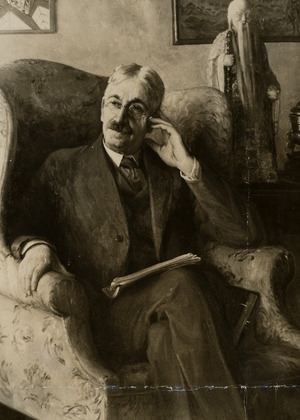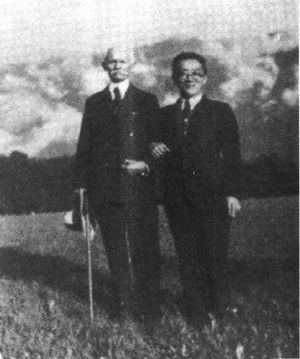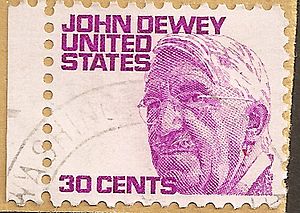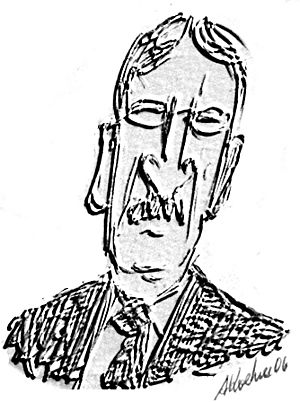John Dewey facts for kids
Quick facts for kids
John Dewey
|
|
|---|---|
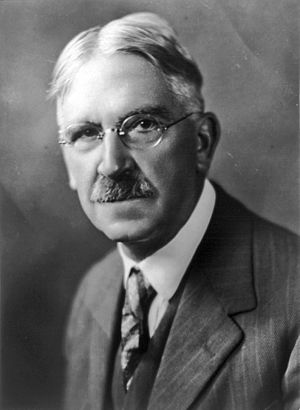 |
|
| Born | October 20, 1859 Burlington, Vermont, United States
|
| Died | June 1, 1952 (aged 92) New York City, New York, United States
|
| Alma mater | University of Vermont Johns Hopkins University |
| Era | 20th-century philosophy |
| Region | Western philosophy |
| School | Pragmatism Instrumentalism Functional psychology Process philosophy |
| Institutions |
|
| Doctoral students | Hu Shih, Feng Youlan, Jiang Menglin, Lin Mosei |
|
Main interests
|
Philosophy of education, epistemology, journalism, ethics, aesthetics, political philosophy, metaphysics |
|
Notable ideas
|
Reflective thinking Functional psychology Immediate empiricism Inquiry into Moscow show trials about Trotsky Educational progressivism Occupational psychosis |
|
Influenced
|
|
John Dewey (October 20, 1859 – June 1, 1952) was an important American philosopher, psychologist, and educational reformer. His ideas greatly changed how people thought about education and society. He was one of the most famous American thinkers in the early 1900s.
Dewey strongly believed in democracy. He thought democracy should be part of politics, education, and even how people communicate. He felt that true democracy meant more than just voting. It also meant that people should share their ideas and work together. He believed schools and communities were key to making this happen.
Dewey was a main figure in a philosophy called pragmatism. This way of thinking focuses on practical results and what works. He is also seen as one of the founders of functional psychology. This field looks at how the mind helps us adapt to our environment. His paper "The Reflex Arc Concept in Psychology" (1896) was a big step in this area.
Dewey was also a major leader in changing education in the 20th century. He supported progressive education, which focuses on learning by doing. While teaching at the University of Chicago, he started the University of Chicago Laboratory Schools. Here, he could test his new ideas about teaching. Besides education, he wrote about many other topics, like ethics (right and wrong) and art.
Contents
- Early Life and Education
- John Dewey's Career
- Personal Life
- Visits to Other Countries
- Functional Psychology
- Pragmatism and Instrumentalism
- Logic and Thinking
- Art and Experience
- Helping Others and Democracy
- Education and Teachers
- Journalism and Community
- Humanism
- Social and Political Actions
- Other Interests
- Religion
- Awards and Honors
- Places Named After Him
- See also
Early Life and Education
John Dewey was born in Burlington, Vermont. His family was not rich. He was one of four boys. His older brother, also named John, died before he was born. The second John Dewey was born on October 20, 1859.
Like his older brother, Davis Rich Dewey, he went to the University of Vermont. He graduated in 1879. A key professor there was Henry Augustus Pearson Torrey. Dewey studied with Torrey privately after college.
John Dewey's Career
After teaching high school for two years and elementary school for one, Dewey decided it wasn't for him. He then went to Johns Hopkins University. He earned his Ph.D. in 1884.
With help from his teacher George Sylvester Morris, Dewey got a job at the University of Michigan. He taught there from 1884 to 1888 and again from 1889 to 1894.
In 1894, Dewey moved to the new University of Chicago. Here, he developed his ideas on pragmatism. He started the University of Chicago Laboratory Schools. These schools allowed him to try out his ideas about teaching. His first big book on education, The School and Society (1899), came from this time.
Later, in 1899, Dewey became president of the American Psychological Association. From 1904 until he retired in 1930, he was a philosophy professor at Columbia University. He also helped start The New School.
Dewey wrote over 700 articles and about 40 books. Some of his most important works include:
- "The Reflex Arc Concept in Psychology" (1896): This paper changed how people thought about how our minds and bodies react.
- Democracy and Education (1916): His famous book on progressive education.
- The Public and its Problems (1927): A book defending democracy.
- Art as Experience (1934): His main work on what art means.
- A Common Faith (1934): A book about religion from a humanistic view.
His ideas were so important that Hilda Neatby said, "Dewey has been to our age what Aristotle was to the later Middle Ages, not a philosopher, but the philosopher." In 1968, the U.S. Postal Service honored Dewey with a postage stamp.
Personal Life
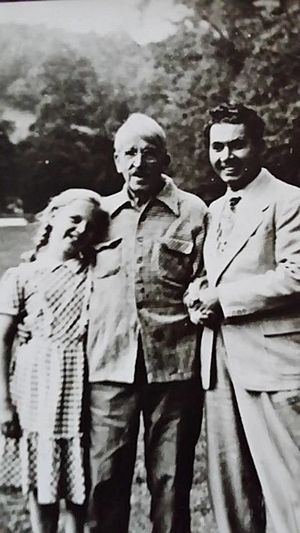
John Dewey married Alice Chipman in 1886. They had six children together. Alice died in 1927.
In 1946, Dewey married Estelle Roberta Lowitz Grant. They adopted two children, Lewis and Shirley.
Death
John Dewey died on June 1, 1952, from pneumonia in New York City. He was 92 years old.
Visits to Other Countries
Visiting Japan and China
In 1919, Dewey and his wife traveled to Japan. While there, he was invited to China by his former students, Hu Shih and Chiang Monlin. They arrived in Shanghai in April 1919. This was just before the May Fourth Movement, where students protested in Peking.
Dewey was excited by the protests and stayed in China for two years. He gave almost 200 lectures to Chinese audiences. He also wrote articles for American magazines. He told the Chinese to focus on education and social changes, not just revolution. Many people came to his lectures, which were translated by Hu Shih. They saw Dewey as a symbol of "Mr. Democracy" and "Mr. Science."
Dewey told Chinese educators not to just copy Western school systems. He suggested they use his ideas to create their own. His ideas influenced education in Hong Kong and Taiwan.
Visiting Southern Africa
In July 1934, Dewey and his daughter Jane visited South Africa. He gave several talks at a conference there. He also visited schools and spoke with students and teachers. The Carnegie Foundation paid for his trip.
Dewey's ideas were not accepted by the white-only governments. But black people and their supporters liked his ideas.
Functional Psychology
At the University of Michigan, Dewey wrote his first two books: Psychology (1887) and Leibniz's New Essays Concerning the Human Understanding (1888).
Dewey and his colleagues at the University of Michigan began to rethink psychology. They focused on how our social environment affects our minds and behavior. This new way of thinking was called functional psychology. It looked at the practical side of how our minds work.
In his paper "The Reflex Arc Concept in Psychology" (1896), Dewey argued against the simple idea of a "stimulus-response" reaction. He said that our actions are more like a circle. What we sense and how we respond are connected and influenced by past experiences.
Pragmatism and Instrumentalism
Dewey sometimes called his philosophy instrumentalism. This is similar to pragmatism. Both ideas focus on how ideas and actions are tools to solve problems. They look at the practical results of our thoughts and actions.
Dewey believed that understanding how we know things (epistemology) was important. He thought that words and ideas should be used clearly. He described three ways of looking at how things work:
- Self-Action: Believing things act on their own.
- Interaction: Things balancing against each other, like in physics.
- Transaction: A modern way of looking at many parts of an action at once. This avoids saying one thing causes another in a simple way.
Logic and Thinking
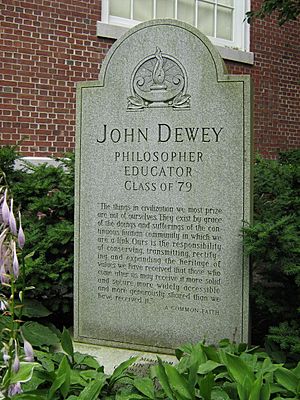
Dewey thought that logic, or how we reason, had a strange problem. People agreed on the small details of logic. But they argued about the big questions of what logic truly means. He wondered if logical rules were just ideas or if they connected to real things.
He also looked at logical positivism, a way of thinking that focuses on what can be proven. Dewey liked that it focused on how we use words and sentences. But he also said that gestures and diagrams are also ways of communicating, not just words. He believed that the meaning of words depends on their context.
Art and Experience
Art as Experience (1934) is Dewey's main book about art. He believed that art is not just something separate. It is deeply connected to the experiences of a local culture. He thought that art should be part of everyday life. Dewey himself wrote poetry, but he felt he was not good at music.
Helping Others and Democracy
Dewey helped start the University of Chicago laboratory school. He also supported groups that helped people, like Jane Addams' Hull House. At Hull House, he saw how important education was for immigrant families. He saw that many children and women lacked schooling.
This helped him understand how people act and how all human experiences are connected. Dewey believed that a woman's role in society was shaped by her surroundings, not just her biology. He said, "Think of them as human individuals for a while, ... and you won't be so sure of some of your generalizations about what they should and shouldn't do." His support helped Hull House and the women's right to vote movement grow.
Some people criticized Dewey. They said he didn't always have clear plans to make his ideas about democracy and education happen. But he knew that old beliefs needed to be checked to see what worked. His work on democracy also influenced B. R. Ambedkar, a student of his who became a Law and Justice Minister in India.
Education and Teachers
Dewey's ideas about education are found in many of his writings. These include My Pedagogic Creed (1897) and Democracy and Education (1916). He always argued that learning is a social process. He believed schools should be places where society can improve. He also thought students learn best when they can experience and interact with what they are learning.
Dewey believed that education should help students reach their full potential. It should not just be about learning facts. He said, "to prepare him for the future life means to give him command of himself; it means so to train him that he will have the full and ready use of all his capacities."
He also saw education as a way to create social change. He said that education helps people share in society's ideas. This helps rebuild society.
How Learning Should Happen
In The Child and the Curriculum (1902), Dewey talked about two main ways of teaching. One way focuses only on the subject matter. Dewey thought this was bad because the student is not active. He said the child is "simply the immature being who is to be matured." He believed learning is best when students connect new information to their own experiences.
The other way focuses too much on the child. Dewey worried this would make the subject matter and the teacher less important. He wanted a balance. He said, "the child and the curriculum are simply two limits which define a single process."
This led Dewey to be a big supporter of hands-on learning or experiential education. He believed that "if knowledge comes from the impressions made upon us by natural objects, it is impossible to procure knowledge without the use of objects which impress the mind." Modern methods like Problem-Based Learning use Dewey's ideas.
The Role of a Teacher
Dewey also changed how people thought about the teacher's role. He believed teachers should not just train students for jobs. Instead, they should help students become thoughtful, independent people. He said schools often make students too obedient.
For Dewey, "The thing needful is improvement of education, not simply by turning out teachers who can do better the things that are not necessary to do, but rather by changing the conception of what constitutes education." He thought teachers should have a natural love for working with children. They should also be curious about what they teach and want to share knowledge.
Teachers as Professionals
Dewey believed that teaching is a very important job, like being a minister or a parent. He thought teachers should help create smart, skilled, and good people in the community. He said, "The business of the teacher is to produce a higher standard of intelligence in the community."
He also thought teachers should have a deep love for learning. They don't need to be experts in every subject. But a true love for one subject will help them understand all subjects better. Teachers should also want to keep learning throughout their careers.
Dewey believed that the best teachers are good at understanding how students' minds work. They can see when students are struggling and help them. He said, "They have a quick, sure and unflagging sympathy with the operations and process of the minds they are in contact with."
Teachers also need to have the right attitude. Teaching can be stressful, with long hours and not much pay. But Dewey said teachers must overcome these challenges. Students can tell when a teacher isn't truly interested in helping them learn.
Dewey thought that teacher training programs should focus on making teachers who are lifelong learners. They should be curious about teaching methods and how the mind learns. He believed that practical skills come with experience. But the desire to learn and grow as a teacher is most important.
Dewey's ideas influenced the founding of colleges like Bennington College and Goddard College. He also helped create Black Mountain College, an experimental college focused on different subjects.
Journalism and Community
Since the 1980s, Dewey's ideas have inspired the public journalism movement. This movement wants journalism to focus on the public and its problems. Dewey defined a "public" as a group of citizens who are affected by the same problem. When people are affected, they want to solve the problem together.
Dewey disagreed with Walter Lippmann's idea that journalists should just give simple information to the public. Lippmann thought the public couldn't think for themselves. Dewey believed that politics is everyone's job. He thought that citizens, experts, and journalists should work together to create knowledge.
Dewey said journalism should focus on choices and results, not just what happened. News should be a constant conversation where people add their ideas. He wrote, "Communication can alone create a great community." He believed that active citizens who communicate well build a strong community.
Humanism
In his later life, Dewey was an secular humanist. This means he believed in human values and reason, without relying on religion. He signed the first Humanist Manifesto in 1933.
Social and Political Actions
Pullman Strike of 1894
While at the University of Chicago, Dewey followed the 1894 Pullman Strike. Workers at the Pullman Palace Car Factory went on strike because their wages were cut. The strike grew, stopping trains across the U.S. President Grover Cleveland sent in soldiers.
Dewey wrote that he was surprised that "higher classes" didn't see why workers were upset. He worried that the University of Chicago was too focused on money.
First World War Stance
Dewey supported the U.S. joining World War I. Some people, like his former student Randolph Bourne, criticized him for this.
Academic Freedom
Dewey was a strong supporter of academic freedom. In 1935, he joined the International League for Academic Freedom. He also helped defend Bertrand Russell in a famous case in 1940.
Dewey Commission
In 1937, Dewey led the famous Dewey Commission in Mexico. This group cleared Leon Trotsky of charges made against him by Joseph Stalin. Dewey also marched for women's rights.
League for Industrial Democracy
In 1939, Dewey became president of the League for Industrial Democracy. This group taught college students about the labor movement. He also helped the National Association for the Advancement of Colored People (NAACP). He supported Henry George's idea of taxing land values.
Other Interests
Dewey wrote about many different topics. He commented on politics and public issues. He even wrote about the Treaty of Versailles and displaying art in post offices.
He also worked with F. Matthias Alexander, who developed a method for improving posture and movement. Dewey wrote introductions for Alexander's books. He also corresponded with other famous thinkers like Henri Bergson and Martin Buber.
Religion
Historians have studied Dewey's religious beliefs. Some say his belief in democracy came from his childhood in the Congregational church. As an adult, he was neutral or negative about religion in education. He focused on using science and human effort to improve society.
Awards and Honors
- Copernican Citation (1943)
- Honorary degrees from the University of Oslo (1946), University of Pennsylvania (1946), Yale University (1951), and University of Rome (1951).
Places Named After Him
- John Dewey High School in Brooklyn, New York.
- John Dewey Academy of Learning in Green Bay, Wisconsin.
- The John Dewey Academy in Great Barrington, Massachusetts.
- John Dewey Elementary School in Warrensville Hts., Ohio.
- John Dewey Middle School in Adams County, Denver, Colorado.
- Dewey Hall at the University of Vermont.
|
See also
 In Spanish: John Dewey para niños
In Spanish: John Dewey para niños
- Center for Dewey Studies
- Democratic education
- Dewey Commission
- Inquiry-based learning
- John Dewey bibliography
- John Dewey Society
- Malting House School
- Pragmatic ethics
 | Chris Smalls |
 | Fred Hampton |
 | Ralph Abernathy |


